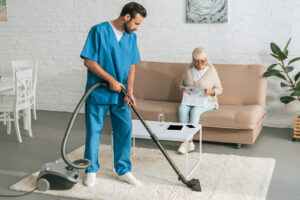Home Care Assistance Tips to Reduce Allergens for Seniors

Allergens: Home Care Assistance Alexandria, VA
Seniors that have allergies or suffer from respiratory illness often have worse symptoms during the summer months. The hot, humid air outside and the cold, dry air conditioned air inside can both lead to an increase in the amount of allergens indoors. Since many seniors must spend hours indoors every day in the summer because of the heat they are strongly affected by indoor allergens like:
- Mold
- Pet dander
- Dust
- Bug droppings
- Mites
- Pollen
Plus many more. Seniors that are aging in place this summer, alongside their home care assistance provider, can do these things to help fight indoor allergens and protect their lungs.
Clean Often
Regular cleaning is essential to minimize allergens in the home. Home care assistance for seniors can help keeping the home clean. With home care assistance seniors don’t have to struggle to do things like vacuum carpets, rugs, and upholstery at least once a week using a vacuum cleaner with a HEPA (High-Efficiency Particulate Air) filter, which traps tiny allergen particles. Care providers should also dust surfaces, shelves, and ceiling fans frequently using a damp cloth to prevent allergens from becoming airborne. Don’t forget about duct covers and heat registers. They collect a lot of dust.
Use Bedding Protection
Dust mites are common indoor allergens found in mattresses, pillows, and bedding. Using high quality mattresses and pillow covers designed to minimize allergens will create a barrier between the senior and the dust mites.
Wash Bedding Regularly
Wash bedding, including sheets, pillowcases, and blankets, in hot water at least once a week to eliminate dust mites, pollen, and pet dander. Home care assistance can help seniors with washing laundry like bedding and towels.
Reduce Humidity
High humidity can promote mold growth and dust mites. Use a dehumidifier to keep indoor humidity levels between 30% to 50%. Additionally, fix any leaks promptly to prevent moisture buildup.
Mold Prevention
Regularly check for signs of mold in areas like bathrooms, kitchens, and basements. Clean and disinfect these areas to prevent mold growth. Ensure good ventilation by using exhaust fans or opening windows when cooking or bathing.
Remove Clutter
Minimize clutter in the living space, as it can accumulate dust and make cleaning more challenging. Keep the home tidy and organized to reduce allergen build-up.
Bathe Pets Regularly
If seniors have pets, regular grooming and bathing can reduce the amount of pet dander in the home. Additionally, designate pet-free zones in the house, especially in bedrooms and living areas.
Use Air Purifiers In Multiple Rooms
Consider using air purifiers with HEPA filters to trap and remove allergens from the air. These devices can be particularly helpful for seniors with respiratory conditions. Put one in the living room and one in the bedroom so that seniors will have an easier time sleeping.
- Allergen-Free Flooring: Consider replacing carpets with hardwood, tile, or linoleum flooring, as carpets can trap allergens. If carpets are preferred, choose low-pile options that are easier to clean.
- Use Natural Cleaning Products: Choose natural or hypoallergenic cleaning products that are free from harsh chemicals and fragrances, as these can trigger allergies and respiratory issues.
